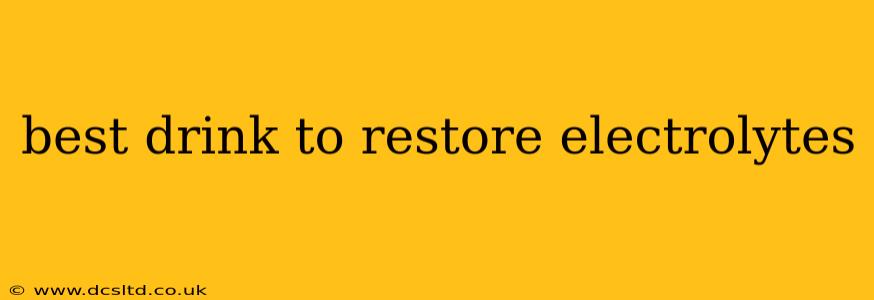Losing electrolytes through sweat, illness, or strenuous activity can leave you feeling drained and unwell. Replenishing these essential minerals is crucial for maintaining proper bodily functions. But with so many options available, choosing the best drink to restore electrolytes can be confusing. This guide will delve into the science behind electrolyte balance and explore various beverages, helping you make informed choices for optimal hydration and recovery.
What are Electrolytes and Why are They Important?
Electrolytes are minerals that carry an electric charge when dissolved in fluids like blood and sweat. The key players are sodium, potassium, magnesium, and calcium. They play vital roles in numerous bodily processes, including:
- Muscle function: Electrolytes are essential for muscle contractions, enabling movement and preventing cramps.
- Hydration: They help regulate fluid balance, preventing dehydration.
- Nerve transmission: They facilitate communication between nerve cells.
- Blood pressure regulation: They contribute to maintaining healthy blood pressure levels.
Depletion of electrolytes can lead to symptoms like muscle weakness, fatigue, cramping, dizziness, and even more serious health issues.
What are the Best Drinks to Restore Electrolytes?
The ideal electrolyte drink depends on the extent of electrolyte loss and individual needs. Here are some top contenders:
1. Water: The Foundation of Hydration
While not an electrolyte-rich beverage itself, water is fundamental to electrolyte balance. It helps dilute electrolytes already present in the body and facilitates their absorption. If you've experienced mild electrolyte loss, drinking plenty of water is often sufficient.
2. Coconut Water: A Natural Electrolyte Source
Coconut water naturally contains electrolytes like potassium, sodium, and magnesium. It's a refreshing and readily available option for mild to moderate electrolyte replenishment. However, keep in mind that the electrolyte content can vary between brands and types of coconuts.
3. Sports Drinks: Formulated for Replenishment
Sports drinks are designed to replace electrolytes lost during intense physical activity. They typically contain a blend of sodium, potassium, and carbohydrates to provide energy and facilitate rehydration. Choose low-sugar options to avoid unnecessary calories.
4. Oral Rehydration Solutions (ORS): For Severe Dehydration
ORS are specifically formulated to treat severe dehydration, often caused by illness like diarrhea or vomiting. They contain a precise balance of electrolytes and glucose to efficiently rehydrate the body. These are best used under the guidance of a healthcare professional.
What Drinks Should You Avoid When Trying to Restore Electrolytes?
Certain beverages can hinder electrolyte restoration or even worsen dehydration:
- Sugary drinks: These can actually dehydrate you further by drawing water out of your cells.
- Alcohol: Alcohol is a diuretic, meaning it increases urine production, leading to further electrolyte loss.
- Excessive caffeine: Caffeine also has a diuretic effect.
H2: What are the signs of electrolyte imbalance?
Signs of electrolyte imbalance can vary depending on which electrolyte is deficient and the severity of the imbalance. Common symptoms include:
- Muscle cramps and weakness: This is often a sign of low potassium or magnesium.
- Fatigue and lethargy: This can be caused by a deficiency of several electrolytes.
- Headaches and dizziness: These can indicate dehydration and electrolyte imbalance.
- Nausea and vomiting: These are common symptoms of severe dehydration and electrolyte imbalance.
- Heart palpitations: In more severe cases, electrolyte imbalances can affect heart rhythm.
If you experience any of these symptoms, especially if they are severe or persistent, consult a healthcare professional immediately.
H2: How much water should I drink to restore electrolytes?
There's no one-size-fits-all answer to this question. Your daily water needs depend on factors like your activity level, climate, and overall health. However, a general guideline is to drink enough water to maintain clear urine and avoid thirst. Listen to your body; if you're thirsty, drink!
H2: Can I get enough electrolytes from food?
Yes, you can obtain electrolytes from a balanced diet rich in fruits, vegetables, and whole grains. Bananas are a good source of potassium, while dairy products contain calcium. However, during periods of intense sweating or illness, supplemental electrolyte drinks may be necessary.
H2: Are electrolyte supplements necessary?
Electrolyte supplements are generally not necessary for healthy individuals with a balanced diet and sufficient water intake. However, they can be beneficial during or after intense exercise, illness, or other situations leading to significant electrolyte loss. Always consult a healthcare professional before starting any new supplements.
Conclusion
Replenishing electrolytes is vital for maintaining health and well-being. While water forms the foundation of hydration, various drinks offer targeted electrolyte replenishment. Choosing the right beverage depends on your individual needs and the extent of electrolyte loss. If you are concerned about electrolyte imbalance, consulting a healthcare professional is recommended. Remember, staying adequately hydrated and maintaining a balanced diet are key to preventing electrolyte deficiencies.
